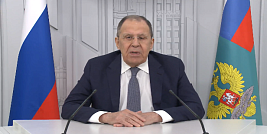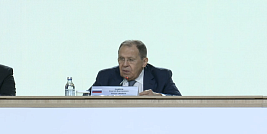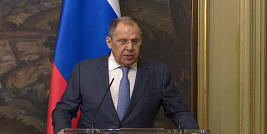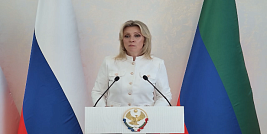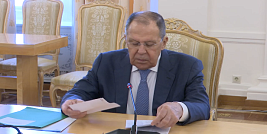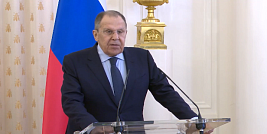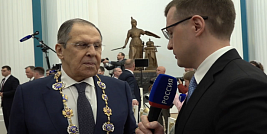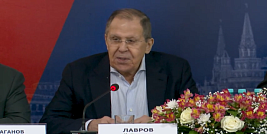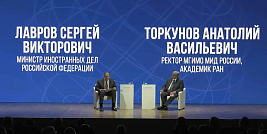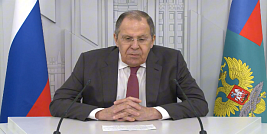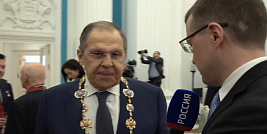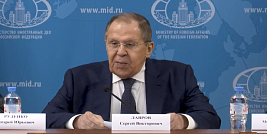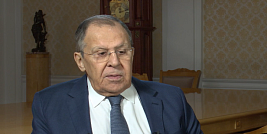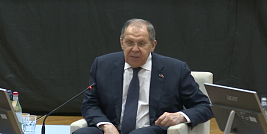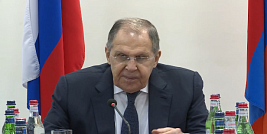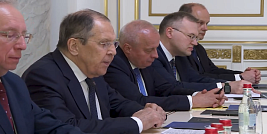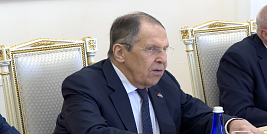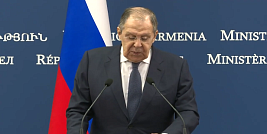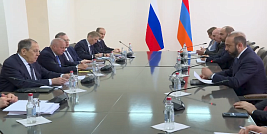Briefing by Foreign Ministry Spokeswoman Maria Zakharova, Moscow, December 15, 2021
Table of contents
- Upcoming briefing by Deputy Foreign Minister Sergey Ryabkov
- The upcoming OIC Council of Foreign Ministers’ 17th Extraordinary Meeting on Afghanistan in Islamabad
- The 17th International Meeting on Syria in the Astana Format
- The UN Security Council meeting on “Maintenance of international peace and security: Climate and security”
- The UN General Assembly’s vote on the resolution “The problem of the militarisation of the Autonomous Republic of Crimea and the city of Sevastopol, Ukraine, as well as parts of the Black Sea and the Sea of Azov”
- Ukraine’s new bill on dual citizenship
- Vladislav Klyushin case
- Fifth anniversary of death of Russian Ambassador to Turkey Andrey Karlov
- Foreign Ministry’s mobile app
- Russian Embassy in China creates account in Douyin social network
- Region-to-region cooperation between Russia and the CIS countries
- Unveiling a monument to Fyodor Dostoevsky in Florence
- G7 Foreign Ministers' Statement
- Moldovan authorities ban entry to Russian public activists
- Russia’s reaction to the opening of a park in honour of Dzhokhar Dudayev
- Estonian government crackdown on Russian-language education
- Azerbaijan invited to the EAEU as an observer
- “Guarantees” of NATO’s non-expansion
- Developments around Julian Assange
- Finland procures US aircraft
- US plans to strengthen Lithuania’s armed forces
- Nationwide referendum in Ukraine
- Armenia and Turkey appoint special representatives
- Russia’s role in normalisation of Armenian-Turkish relations
- Assessments of the outcomes of the Armenian and Azerbaijani leaders’ meeting
- RT’s Not One on One project
- Situation on the Ukrainian border
Upcoming briefing by Deputy Foreign Minister Sergey Ryabkov
On December 15, during a meeting between Deputy Foreign Minister Sergey Ryabkov and US Assistant Secretary of State for European and Eurasian Affairs Karen Donfried, Russia presented its security initiatives to the United States. They had been voiced a number of times in the past by President of Russia Vladimir Putin and were set forth in the Russian Foreign Ministry’s Statement of December 10, 2021. On December 15, the initiatives were officially handed over to our US partners. We maintain contacts with them.
Deputy Foreign Minister Sergey Ryabkov is planning to discuss the details of this ongoing work at a special briefing for Russian and foreign correspondents and journalists. The briefing is scheduled to begin at 2 pm on Friday, December 17.
We will soon post the relevant announcement, and media representatives will be able to apply for accreditation. The briefing will be held via videoconference.
The 17th Extraordinary Session on Afghanistan of the Organisation for Islamic Cooperation (OIC) Council of Foreign Ministers is scheduled to be held on December 19 in Islamabad. Its participants will review the situation in Afghanistan. Special Presidential Representative for Afghanistan and Director of the Foreign Ministry's Second Asia Department Zamir Kabulov will represent Russia at the meeting.
We hope that this event will make it possible to coordinate approaches to the Afghan agenda and to focus on coordinated regional and international efforts to provide humanitarian and economic assistance for Afghanistan.
There are plans to hold a meeting of the extended Troika with the participation of the special representatives of Russia, China, the United States and Pakistan, on the sidelines of the event.
The 17th International Meeting on Syria in the Astana Format
On December 21-22, 2021, Nur-Sultan will host the 17th International Meeting on Syria in the Astana Format. According to current practice, apart from high-ranking representatives of the three guarantor countries, namely, Russia, Iran and Turkey, the upcoming event will involve delegations of the Government of the Syrian Arab Republic and the Syrian opposition, as well as observers from Iraq, Jordan and Lebanon, representatives of the UN and the International Committee of the Red Cross.
Meeting participants will conduct a detailed discussion of developments in the Syrian Arab Republic and around it, and focus on efforts to further stabilise the situation on the ground and to advance a comprehensive political settlement under the provisions of UN Security Council Resolution 2254. They will also consider ways to mibilise collective efforts to help normalise the humanitarian situation in Syria, including through the implementation of projects to quickly rebuild the country’s social and economic infrastructure.
On December 13, 2021, the UN Security Council held a vote on a draft resolution concerning climate and security. Russia voted against it.
The draft’s authors, Ireland and Niger, with the support of a number of Security Council members, submitted a document that sought to focus on climate and security, a topic that goes beyond the Security Council’s mandate.
The Russian Federation, together with India and China, does not share these approaches.
It should be mentioned that the co-authors deliberately sought to cause a confrontation, since they were aware that the text they had submitted for a vote was unacceptable for over 80 countries.
We note the lack of objective scientific data on the interconnection between climate and security in the context in which this was formulated. We regard attempts to assign to peacekeeping missions irrelevant functions without their appraisal by experts as counterproductive.
Together with China and India, we have proposed an alternative project that makes it possible to hold a comprehensive discussion of the climatic, socioeconomic and political challenges in the Sahel region with account taken of the region’s specific features represented by Niger, one of the authors of the draft resolution on climate and security.
For our part, we intend to continue proactive efforts to fight climate change at relevant environmental venues, primarily that of the UN Framework Convention on Climate Change. Our partners’ actions are regrettable, particularly in view of the generally successful negotiations in Glasgow in November.
Last week, the UN General Assembly approved the Ukrainian draft resolution entitled “The problem of the militarisation of the Autonomous Republic of Crimea and the city of Sevastopol, Ukraine, as well as parts of the Black Sea and the Sea of Azov.” The main aim of this resolution is to drag the General Assembly into Kiev and its Western patrons’ anti-Russia campaign. We are aware that this venture was clearly spurned by the majority of countries.
Once again, the document has gained less than one-third of the vote, while the number of states opposing the resolution steadily grows from year to year. This trend clearly demonstrates what can be described as the international community’s fatigue with Ukraine’s persistent attempts to turn the United Nations into a platform for settling scores with Russia.
The resolution is based on groundless accusations that Russia is allegedly destabilising the situation in and around Crimea. The document fails to reflect a number of aggressive measures undertaken by Ukraine in the Sea of Azov, where it has redeployed warships and regularly holds artillery exercises.
Our position on the status of the Republic of Crimea and the city of Sevastopol as constituent entities of the Russian Federation is not subject to any revision. The peninsula’s reunification [with Russia] took place in full conformity with international law, primarily the right of nations to self-determination, sealed, let me remind you, by the United Nations Charter.
The situation in Ukraine is alarming, considering the country’s militarisation, human rights violations and the internal conflict in Donbass.
NATO countries are sending more weapons to Ukraine and are training its military personnel. They are not doing this for the mythical purpose of maintaining stability and security but to add fuel to the fire and scale up the ongoing civil war in the country. I would like to remind you that since 2014 the United States has provided $2.5 billion worth of military aid to Ukraine, including over $400 million this year. Washington has recently supplied 30 Javelin anti-tank missile systems (we have already commented on these “efforts,” which are obviously not aimed at a peaceful settlement in southeastern Ukraine) and 180 missiles for them worth $60 million. In 2022, it plans to send $300 million worth of weapons and military equipment to Kiev. The first batch worth $20 million is to be dispatched in January. It includes video surveillance and communications systems, special transport, drones and so on. This will not help to deal with the humanitarian problems of people in Donbass, will not facilitate a peaceful solution to the armed conflict, and will not create conditions for the implementation of the Minsk Agreements.
The money could have been used for more peaceful humanitarian purposes, for example, to cover nearly all the pension arrears in Donbass. According to Ukrainian officials, these arrears are estimated at some $3 billion. Has Kiev forgotten about its obligations to those who, they claim, are citizens of Ukraine? It is a rhetorical question, but we would like the Kiev regime to answer it, nevertheless.
Western instructors continue training Ukrainian military personnel, as we point out at nearly every briefing, including downright neo-Nazis, as the recent scandal at the Sagaidachny National Ground Forces Academy showed. Some 10,000 NATO troops, including 4,000 US soldiers and 6,000 troops from other bloc members, have been deployed in the country of “victorious Maidan.”
The Verkhovna Rada is considering a draft law that allows foreign troops to be deployed in Ukraine for participation in nine military exercises in 2022. I call on those who have not read the Minsk Package of Measures to do so now. It has a clause on the obligatory withdrawal of all foreign troops from Ukraine. As for the exercises, I am referring to the multinational drills that are to be held in Ukraine jointly with its Western curators, such as Joint Efforts, Maple Arch and Light Avalanche (these are not the names of X-rated films). There are also the Sea Breeze and Viking drills, the US-Ukrainian Rapid Trident, the UK-Ukrainian Cossack Mace, the Polish-Ukrainian Silver Sabre and the even more romantic Romanian-Ukrainian drills Riverine. All of them have a common concept, are anti-Russia and have nothing to do with restoring peace, tranquillity and security in southern Ukraine.
We have pointed out on numerous occasions that Ukraine’s militarisation is not helping to settle the internal Ukrainian conflict but is only encouraging Kiev to repeat the military gambles of 2014 and 2015. It is common knowledge that they have claimed tens of thousands of civilian lives, have forced hundreds of thousands of people to leave their homes, have ruined the civilian infrastructure, and have destroyed the very possibility of resuming normal life in the near future. The destruction is colossal. Millions of lives have been ruined.
In this context, the Ukrainian establishment produced the concept of a referendum on Donbass. This interesting scheme has been mentioned by President of Ukraine Vladimir Zelensky and Chair of the Verkhovna Rada Ruslan Stefanchuk. What is its essence? It boils down to the following: the future of Donbass is to be decided at the nationwide level but – this is the key element – without the participation of the Donbass residents. Have you seen anything like this before? And the idea has been put forth by those who claim that the Crimean status referendum was illegal, improper and held at gunpoint. These people intend to hold a nationwide referendum on the future of Donbass without the residents of Donbass. How can this be? If they want their voice to be heard, they will have to travel to other Ukrainian regions to cast their ballots. The referendum will not be held in the territory of Donbass. What can I say to this? I am not sure that it is a matter of double standards, and this is not mere hypocrisy either. That’s quite another kettle of fish. I believe that derision is a better word. We are being told that the future of Ukraine cannot be discussed without Ukraine. Here is my question then: Can the future of Donbass be discussed without Donbass? Something should be done with this distorted logic.
The Kiev regime prefers to forget that under the Minsk Package of Measures all aspects of a settlement are to be discussed in a direct dialogue between Kiev, Donetsk and Lugansk as the parties to the conflict. Apart from the will of some political leaders, there is also the Package of Measures that has been approved in a UN Security Council resolution and provides for deciding the future of the region through dialogue.
Regrettably, lawlessness and rabid neo-Nazism have become a fact of life in Ukraine. Opposition parties are being persecuted. Methods of intimidation and violence are being used against the journalists, bloggers, media outlets, editors and ordinary people who try to go against the mainstream, which has turned into a wild train moving at breakneck speed towards an undisclosed destination that looks increasingly like a dead-end. We can see this happening every day. Unfortunately, the international community and relevant organisations, which promptly react to any infringements on freedom of speech in other parts of the world, do not see or prefer to close their eyes to this.
A week ago, Ukraine’s Cyber Police launched criminal proceedings against the scandalous website Mirotvorets. It opened over seven years ago to publish the personal data of opponents of the regime, resulting in assassination attempts (some of them successful), harassment, political persecution and household crimes. This is a modern-day reality in Ukraine. You may recall what happened to Oles Buzina. Despite these activities of the Mirotvorets site, a criminal case was initiated against it only when it started publishing the personal data of children and a girl from Lugansk wrote an open letter about this to the UN Secretary-General.
We hope that this criminal case will be investigated thoroughly and objectively under the watchful eye of international organisations. Many people wonder what Russia has to do with this, and why we comment on such developments. The thing is that there are the personal data of many Russian citizens, public figures and journalists on that website. They have been receiving threats for years. We hope that Kiev will at long last show the legal, political and human will to shut down this extremist resource.
We urge Kev’s Western patrons and international organisations to open their eyes to the developments in Ukraine, because their silence is encouraging its militarisation. They must use their influence to convince the Ukrainian authorities of the need to implement the Minsk Agreements and to preclude an escalation of tension with unpredictable consequences for regional and European security.
Ukraine’s new bill on dual citizenship
We are closely following the Ukrainian government’s legislative initiatives, especially those that concern our compatriots. On December 2, 2021, President of Ukraine Vladimir Zelensky submitted a bill amending the country’s Citizenship Law to the Verkhovna Rada. The new legislation will legalise dual citizenship for Ukrainians living in the West (in the EU, Canada or the United States), while Ukrainians who have adopted Russian citizenship will face sanctions such as fines and even restriction of liberty.
I am sure you have all heard of apartheid, a system that existed in the 20th century. It would seem that this ugly practice would never extend to the European continent or affect the nations that have so beautifully and clearly articulated their adherence to very “advanced” values and approaches to respecting humanistic ideals – human rights, freedom of speech, and other democratic principles. But this bill is segregation of the worst kind. Segregation is a monstrosity that humanity has had to go through. How is it possible that it is brought back by the political leaders of a European state, an OSCE member, a country that associates itself with the European Union and supports the same provisions as the EU, joining the EU while voting in the United Nations and other international platforms, sharing and supporting EU initiatives? Where are all the human rights champions now? This should have called for a most serious discussion at the international level. How could the international community allowed this to happen – not in some uncontrolled corner of the world run by thugs and extremists, but in a state that declares its priorities as similar to those of the Western community, is a member of the United Nations and other international platforms, and participates in leaders’ summits in various formats? This flatly proves not only the absence of any legal culture, but the lack of a basic understanding of the correlation between domestic legislation, international law and the current reality.
Such things and decisions show that there is a legal vacuum in Ukraine. Yet, there is something we understand perfectly well, although I think the West does not – that all this is in line with Kiev’s official policy of direct discrimination against its own residents on the basis of their language and ethnicity. Such initiatives are aimed at the total Ukrainianisation of the country by methods that are incompatible with the goals declared by the Western community in the 21st century and diverting Ukrainians’ attention from the depressing socioeconomic reality. But this is their internal aspect. The root cause directly concerns the international community.
Pursuing such a policy, Kiev is purposefully limiting Russia's ability to support its compatriots living in Ukraine. We are doing this while making every effort to observe Ukrainian laws. In April 2021, the Ukrainian authorities imposed sanctions against Rossotrudnichestvo, which was forced to curtail its work in the country – its legitimate, transparent work focused on helping and supporting our compatriots.
Despite this, we continue to use all available means to support our compatriots. First of all, this concerns the provision of consular services by Russian diplomatic and consular missions in Kiev, Lvov, Odessa and Kharkov. We intend to continue to raise the international community’s awareness of the massive violations of the rights of Russian-speaking citizens in Ukraine at the UN, OSCE, Council of Europe and other platforms, and to use their human rights tools. Human rights violations were included in the Russian Federation vs Ukraine interstate complaint lodged with the European Court of Human Rights on July 22, 2021.
We have no other choice but to take urgent action to support Russian citizens who live in Donbass suffering from the inhuman economic and transport blockade imposed by Kiev.
We will continue to provide the necessary assistance to our compatriots in Ukraine. Once again, we call on the Ukrainian government to put an end to the policy directed against its own people.
We are deeply disappointed with the Swiss Federal Criminal Court’s decision to satisfy the US’s appeal to extradite Russian citizen Vladislav Klyushin to the United States. The Swiss law enforcement agencies ignored the lawyers’ arguments on the political nature of the case, and groundlessly dismissed an appeal from the Russian Prosecutor General’s Office to block Klyushin’s extradition. Instead, they chose to accept the groundless accusations of the United States, which continues to initiate arrests of Russians in third countries and demand their extradition. Russia has repeatedly made diplomatic demarches and voiced deep concerns to Switzerland, urging it to investigate all circumstances of this case in an unbiased and objective manner. Unfortunate, our arguments were not heard by Bern.
The Russian Embassy maintains close ties with Klyushin’s attorneys in order to protect and support his rights, and provides him with the necessary consular assistance. The defence will continue to use all legal rights provided by Swiss laws to block the extradition of the Russian national to the United States. On December 6, 2021, the lawyers submitted a writ of appeal to the Federal Supreme Court of Switzerland.
Fifth anniversary of death of Russian Ambassador to Turkey Andrey Karlov
On December 19, 2016, Ambassador Extraordinary and Plenipotentiary of Russia to the Republic of Turkey Andrey Karlov was killed in a heinous and treacherous terrorist attack. He was awarded the title of Hero of the Russian Federation posthumously.
Five years ago, a true professional and patriot of the Fatherland met his untimely death.
We appreciate that the Turkish justice agencies strongly condemned the barbaric act of aggression whose innocent victim was the prominent Russian diplomat. Together with our Turkish colleagues, we held a thorough investigation into the circumstances of this crime.
The consistent development of bilateral dialogue with Ankara, including in some key areas, suggests that the main intention of the organisers of this crime – to undermine the normalisation of bilateral relations at that time as well as collective efforts to stabilise the situation and launch a political settlement in Syria – has completely failed.
This incident provided an impetus to strengthening the security of Russian citizens and missions abroad and redoubling our efforts against terrorism.
We cherish the memory of Andrey Karlov, who was killed in the line of duty and who tirelessly protected the interests of our Motherland.
On December 10, 2021, the Foreign Ministry launched its own official mobile app. It is available at App Store and Google Play.
We hope to provide our audience with more opportunities to monitor the news from the ministry and learn current contact details of our diplomatic missions online. This is the purpose of the Foreign Ministry app that is available in two languages, Russian and English. There is no need to open the ministry website in the browser. One only needs to download the app on a smartphone, tablet or laptop.
The app’s functionality includes the Foreign Ministry newswire, push notifications on new materials, online video broadcasts, and much more. It is possible to view content offline. The navigation is very simple but user-friendly. The interface does not differ from that of the ministry website.
The Press Service section in the app was developed for Russian and foreign journalists and includes announcements, contacts and lists of accredited journalists.
A banner with a link to the app is located on the main page of the ministry’s official website. More than 4,000 users have downloaded the app over the past few days.
Russian Embassy in China creates account in Douyin social network
The Foreign Ministry continues to conquer the digital space and develop its online resources. It is a new area in our digital diplomatic activity, and quite an interesting one, in my opinion.
I’d like to congratulate the Russian Embassy in China with reaching another peak – opening an account in the Chinese segment of TikTok, the Douyin social network.
Douyin is a short-video platform launched in 2018. It belongs to the Beijing-based company ByteDance. TikTok and Douyin are two versions of the same app that are located on different servers.
The first video published on this platform featured Russian Ambassador Andrey Denisov who said a few welcome words and read the famous poem by great Chinese poet Li Bai “Quiet Night Thought.” There are also virtual tours of the historic buildings of our unique embassy complex.
The number of subscribers already exceeds 500,000 with over 14 million views and more than 1.3 million likes. Dozens of thousands of users leave their comments in support of Russia-China friendship.
This February, the Foreign Ministry launched a TikTok account and publishes short videos reporting on talks and Foreign Minister Sergey Lavrov’s visits, and videos about the everyday life of Russian diplomats and foreign missions, flashmobs marking notable international events and landmark events in the history of Russia. It is a very interesting channel. Come and have a look. Translated Russian-language materials by our colleagues from our embassy in Beijing are also available now.
I would like to use this opportunity to invite everyone who has not subscribed to our accounts yet, to learn about the list of our accounts, there are over 700 of them. It includes the main staff, departments, embassies, permanent missions, consulates-general and territorial representative offices of the Foreign Ministry in Russia as well as our diplomats’ blogs.
To learn more, go to the Social Media tab at the Press Service section on the ministry’s website.
I would like to say the following to our Chinese friends:
请在社交网络上订阅俄罗斯外交部和俄罗斯驻华大使馆的资源。关注我们的动态!掌握俄罗斯外交政策的第一手资料。 保证会让人乐在其中。
Sign up to the social network accounts of the Foreign Ministry and our embassies.
Region-to-region cooperation between Russia and the CIS countries
At a briefing last week, I promised to provide an update on region-to-region cooperation between Russia and the CIS countries. I am now about to deliver on that promise.
The Russian regions’ cooperation with the CIS countries is of a strategic nature and is a priority area in our foreign policy. It remains a standing item on the agenda of the contacts at the top and high levels.
The annual region-to-region cooperation forums contribute significantly to the development of ties between Russian regions and their CIS counterparts. The 8th Forum of the Regions of Russia and Belarus dedicated to Scientific and Technical Cooperation between Russia and Belarus in the Digital Era was held via videoconference on June 29 - July 1, with the participation of President Vladimir Putin and President Alexander Lukashenko.
Region-to-region ties are at the core of trade and economic cooperation with Kazakhstan, with 76 out of 85 constituent entities of the Russian Federation participating in them, ensuring steady growth in trade between our countries, which is expected to exceed the record high of $20 billion by the end of this year. The 17th Forum of Region-to-Region Cooperation between Russia and Kazakhstan was held online on September 28-30 and focused on Cooperation in Environmental Protection and Green Growth. President Vladimir Putin and President of Kazakhstan Kassym-Jomart Tokayev addressed its participants. A number of interstate and region-to-region agreements and commercial contracts between economic agents were signed following the forum. The forum re-affirmed the importance of this mechanism for boosting the most important areas of interaction.
The 2nd Forum of Region-to-Region Cooperation between Russia and Uzbekistan was held in a mixed format in Moscow on November 17 with the goal of creating a single space for establishing and reinvigorating direct business ties and practical interaction between the two countries’ regions. President Vladimir Putin and President Shavkat Mirziyoyev sent video addresses to the forum participants. Thirty-nine investment agreements, totalling $4.5 billion and 455 trade agreements, worth $1.6 billion, were signed on the sidelines of that event. The regional administrations are expected to start working on 75 new investment projects in promising areas.
Region-to-region ties with Tajikistan are quite dynamic, which was unanimously noted during the 8th Conference on Russia-Tajikistan Region-to-Region Cooperation held in the city of Bokhtar, Republic of Tajikistan, on November 29-30. The event was attended by officials from the central, regional and local governments, public figures, entrepreneurs, researchers and analysts from Russia and Tajikistan. The participants discussed approaches to expanding interaction between the two countries in industry, logistics and the digital economy, agriculture and advanced urban solutions, as well as cooperation in youth affairs and education. Two agreements were signed between the Government of the Russian Federation and the Government of the Republic of Tajikistan. The bilateral Interparliamentary Forum on Region-to-Region Cooperation, which will tentatively convene in Tajikistan in February-March 2022, has an important part to play in promoting bilateral ties.
The Russian-Turkmen intergovernmental agreement on promoting region-to-region cooperation, which was signed in Moscow on March 30, will provide the regulatory framework underlying this area of interaction with Turkmenistan.
About 70 constituent regions of the Russian Federation maintain relations with all regions of Armenia. Nineteen Russian regions have already signed agreements on trade, economic, scientific, technical and cultural cooperation with the Armenian regions.
The 8th meeting of the Russian-Armenian Region-to-Region Forum was held in Yerevan on October 18-19. A plenary session on region-to-region interaction between the two countries and a meeting of co-chairs of the joint working group on Russian-Armenian region-to-region cooperation at the Intergovernmental Commission on Economic Cooperation between Russia and Armenia were held as part of this meeting. Resolution of the Government of the Russian Federation No. 3124-r On Signing a Programme for Region-to-Region Cooperation between the Government of the Russian Federation and the Government of the Republic of Armenia for 2022-2027 was signed on November 2.
We focus particularly on promoting the Republic of Crimea in the international arena. Crimea Days in Armenia were held in Yerevan on April 28-30. To promote its contacts with Belarus, the Crimean delegation took part in the Belarusian Innovation and Industrial Forum which was held in Minsk on September 28-30. On October 7-8, Minsk hosted a presentation conference focusing on the Republic of Crimea’s economic potential. Representatives from Crimea took part in international exhibitions AGRO WORLD Kazakhstan and FOOD EXPO Kazakhstan in Astana on November 3-5, and on November 17, delegates from the Government of the Republic of Crimea took part in the 2nd Forum of Region-to-Region Cooperation between Russia and Uzbekistan.
At our briefing last week, we highlighted the ties between Russian regions and Azerbaijan in the context of Astrakhan Region Governor Igor Babushkin’s visit to Baku on December 6-8. An opening ceremony for the Astrakhan Business Centre in Baku was held as part of the visit programme, and a Memorandum of Cooperation between the Astrakhan Business Centre in Baku and the Azerbaijan Business Centre in Astrakhan was signed.
In general, this cooperation is making strides. In 2021, business missions from Moscow, and the Rostov, Saratov, Tambov, Tyumen and Yaroslavl regions, Krasnodar Territory, Adygea, North Ossetia and Khakassia visited Baku. Business missions of companies from the Bryansk, Vladimir, Volgograd, Voronezh, Kirov, Novgorod, Rostov, Saratov and Ulyanovsk regions, Perm and Krasnodar territories, Dagestan, the Republic of Crimea and Khakassia were held via videoconference.
Moscow ($780 million), the Moscow Region ($378 million) and the Stavropol Territory ($154.5 million) were leading trade and economic cooperation with Azerbaijan in January-September 2021.
The contractual basis for region-to-region cooperation between Russian regions and the CIS countries is being improved. This year, 10 agreements on cooperation in various areas have been concluded between the constituent regions of the Russian Federation and their CIS partners. Soon, the Russian Government will give the green light to another agreement between the Sverdlovsk Region Government and the Government of the Republic of Belarus.
Unveiling a monument to Fyodor Dostoevsky in Florence
It would not be an exaggeration to say that in 2021 the whole world is celebrating the 200th birth anniversary of the great Russian writer, philosopher and thinker Fyodor Dostoevsky. Various international projects, including Russian-Italian undertakings, are being implemented as part of the celebrations. For example, the State Museum of the History of Russian Literature opened a unique exhibition, “Russia and Europe in Fyodor Dostoevsky’s Work and Fate,” in Milan in September 2021. This was done under the aegis of the 2021-2022 Russian-Italian cross Year of Museums.
On December 14 of this year, a bronze monument to Dostoevsky was unveiled in the Parco delle Cascine in Florence (Tuscany, Italy). Why precisely this place? The writer lived there at one time and completed his novel The Idiot. Made by the Russian sculptor and member of the Russian Academy of Fine Arts Aidyn Zeynalov, the monument is installed next to an alley named after Dostoevsky. The unveiling ceremony was attended by Presidential Adviser on Culture Vladimir Tolstoy, representatives of the Russian Embassy in Italy, President of Tuscany Eugenio Giani, Mayor of Florence Dario Nardella, representatives of the public and the academic community, and journalists. The Italian participants thanked Russia for donating the sculpture to the city of Florence and praised bilateral cooperation in culture and the humanities.
It was possible to implement this project owing to support from the municipal and regional authorities as well as Italy’s Ministry of Culture. The unveiling of the monument to the great Russian writer in the year of his 200th birth anniversary provides yet more evidence that no unfavourable situations or conditions can weaken the strong bonds of friendship between our two nations. Therefore, this approach and precisely these landmarks should become our priorities in other areas as well.
Question: The G7 countries have denounced Russia’s military build-up and aggressive rhetoric towards Ukraine, as the G7 foreign ministers say in their joint statement. Earlier you called these accusations an information campaign. What, in your view, was behind its launch? What might it lead to?
Maria Zakharova: We have perused the G7 foreign ministers’ statement on Russia and Ukraine, published following their meeting in Liverpool. The G7 ministers were joined by EU High Representative for Foreign Affairs and Security Policy Josep Borrell. The statement reflects the current state of the Western community’s “collective mentality.”
Familiar as we are with present-day realities, we saw nothing constructive in it. This is the same old set of trite allegations, clichés and accusations hinging on an utterly false premise that Russia is engaged in “military preparations” against Ukraine.
We have repeatedly said that Russia has the full right to deploy and redeploy military units in its own sovereign territory at its discretion and that it has no aggressive designs. We have provided relevant explanations for many years.
On December 10, the Russian Foreign Ministry published its Statement on Dialogue with the United States and Other Western Countries regarding Security Guarantees to the Russian Federation. This statement is intended for the member states of both G7 and NATO and outlines specific proposals on how to reduce tensions over Ukraine. Indicatively, the G7 ministers chose to avoid mentioning this important subject in public. We doubt that they will be able to solve this problem by hushing it up or evading a discussion of issues raised by the Russian Federation. We hope to receive intelligible feedback.
Question: Moldovan authorities have banned a number of prominent Russian public activists, political analysts and experts, including representatives of the Civic Chamber, the Institute of CIS Countries and the Presidential Council for Civil Society and Human Rights, from entering the country. How do such bans correlate with the statements by Moldovan leaders on their readiness for pragmatic dialogue with Russia?
Maria Zakharova: We have commented on this outrageous incident when Russian citizens were prohibited from entering the country via Chisinau International Airport. We are talking about prominent Russian public activists, political analysts, historians, etc. They contacted the Russian Embassy in Moldova, which assisted them, whenever possible, during their stay in the transit zone, as they waited for a flight back to Russia.
As far as we understand, the actions of the Border Police Force of the Republic of Moldova were linked with the December 12, 2021 election in Transnistria. It appears that the election frightened the Moldovan government, which started indiscriminately extraditing everyone from the country.
Each extradited person had certain reasons for visiting Moldova, including participation in social and political events, meetings with Moldovan partners and compatriots, scientific research and personal reasons. Some Russian citizens had been officially invited by their Moldovan partners. Moldovan authorities chose to ignore these circumstances, and Russian citizens spent hours waiting for a return flight through the night.
Regardless of the real reasons behind the Moldovan authorities’ decision to ban contacts between representatives of our countries’ civil societies, this hardly correlates with statements on their readiness for constructive and pragmatic dialogue with Russia. I am not talking about democratic standards to which Chisinau remains verbally committed. We would like this to be translated into real life as well. Notably, these standards stipulate a respectful attitude towards civil society institutions and their representatives.
We hope that Chisinau will renounce such unfriendly steps, which will not go unanswered, and that the country’s authorities will focus on expanding Russian-Moldavian cooperation.
Question: Dzhokhar Dudayev Park has been opened in a suburb of Istanbul. What is your attitude to this?
Maria Zakharova: Our principled position regarding the installation of any kinds of monuments to extremists, terrorists, militants and collaborators remains unchanged, and it applies to any location where this may happen.
Question: The Estonian Ministry of Education has published a plan for the transition of Russian schools to Estonian-language curricula by 2035. The Prime Minister of Estonia said that the plan offers equal opportunities to all Estonian citizens. Can you comment on this?
Maria Zakharova: It is obvious that first the Estonian authorities did away with Russian-language higher education and vocational training, and now they have shifted the focus to secondary and even preschool education.
We fully agree with the report presented the other day by the independent NGO, Estonian Human Rights Centre, according to which the shared narrative of Estonia as a developed democracy cannot be shaped without a fair attitude to national minorities. The current developments in the Estonian education system can only be described as a forced assimilation of Russian-speaking children, who are deprived of the right to receive an education in their native language. The action plan for the transitioning of state general education schools to Estonian-language curricula by 2035 allows the state to unceremoniously interfere in the affairs of local governments and to dismiss unsuitable school principals. Representatives of the Russian diaspora, which constitutes approximately a third of Estonia’s population, have not even been invited to take part in the debates and the decision-making process, although the Estonian authorities are fully aware of the predominantly constructive attitude of Russian speakers to integration and proficiency in the state language, provided they have a legal opportunity to receive an education in their native language. None of that is taken into consideration.
We demand that the relevant international organisations – the UN, the OSCE and the Council of Europe – provide an objective assessment of Tallinn’s failure to comply with its international legal commitments in this sphere and comment on discrimination against the language rights of national minorities in Estonia.
Question: Nursultan Nazarbayev has suggested giving Azerbaijan observer status in the EAEU. What is Russia’s view on this initiative? How can the EAEU and Azerbaijan benefit from cooperation?
Maria Zakharova: The initiative proposed by Nursultan Nazarbayev, who is rightfully regarded as the ideologist of Eurasian integration, is worthy of attention. The EAEU is open for any state that shares its goals and principles and is interested in promoting integration. First of all, this applies to the CIS countries that are closely cooperating with EAEU member states.
The EAEU is rapidly developing, improving the instruments of economic interaction with due regard for the best international practices and is actively modernising its transport infrastructure. The EAEU has created a cutting-edge system of technical regulations based on international experience. Despite the current difficulties caused by the pandemic, the majority of its macroeconomic indicators are showing positive dynamics.
We believe that the development of dialogue between Azerbaijan and the EAEU in any format would contribute to mutual trade, the unblocking of transport arteries in the region and the implementation of ambitious infrastructure projects. Bear in mind, however, that all decisions on upgrading the level of interaction with the EAEU are taken by the consensus of all the member states and the interested party following a comprehensive expert analysis of the possible economic consequences of such decisions.
Question: The history of relations with the United States points to the negative predictability of the country. The recent US actions, such as its withdrawal from the ABM Treaty and the Iran nuclear deal, show that it does not honour its commitments. How can we expect NATO to guarantee its non-enlargement under these circumstances?
Maria Zakharova: A few days ago, NATO Secretary General Jens Stoltenberg once again questioned Russia’s idea of a moratorium on the deployment of intermediate- and shorter-range missiles in Europe. He said that the idea was not credible. But it is his statements that are not credible. Didn’t NATO countries’ representatives assure us that the bloc would not expand eastward? Didn’t they tell us that the planned deployment of US BMD systems in Poland and Romania was aimed exclusively against the potential Iranian threat? Didn’t they keep silent when the United States pulled out of the INF Treaty? Many young experts will be hard put to believe that this is exactly how NATO explained its actions.
In fact, NATO is doing everything it can to destabilise the continent and undermine the foundations of European security. We have advanced proposals regarding such a moratorium more than once, including proposals on the verification measures that would allow Western countries to see that there are no such missiles in the European part of Russia.
But these measures must be based on reciprocity. We can see from the recent Western actions that they are not ready to accept verification measures, which will stipulate the inspection of BMD facilities in Poland and Romania, including the Mk 41 launchers for Tomahawk missiles. Are they ready to let us inspect them? The answer is no.
NATO promises cannot be trusted if they are not backed by actions. We have presented our proposals, and we will move forward based on their practical reaction to them.
Question: The whole world is witnessing Julian Assange’s extradition to the United States. Does the Russian Foreign Ministry regard the response to this by the world media and the official authorities of foreign countries as a manifestation of double standards, given their focus on scandals involving journalists in Russia? Why is there no official position?
Maria Zakharova: Our position or theirs? Russia has regularly commented on this topic. There was a relevant comment immediately after the court ruling. Initially we spoke about the hypocrisy and double standards. Now, based on data from international experts, we are speaking about the use of harassment and torture against this public figure and journalist. You may call him whatever you like. In any event, he is a man committed to freedom of speech, a principle of fundamental importance for international relations. Through his life and actions, he has defended the values that many people mention only while making official statements. Russia has regularly provided its assessment of developments involving Julian Assange. Our Western partners’ actions over the last few years smack of real cannibalism. This is not about double standards, or about trampling upon noble principles and ideals. This is about annihilating a person, taking revenge for his position and courage, for his deeming it necessary (obviously conscious of the possible risks) to share with the people of the world sensitive information shedding light on lies and the deception practiced by a number of states. Proceeding from a position based on these false assertions, Western countries launched an invasion and an aggression that took the toll of numerous civilian lives. Everyone’s life is priceless. But in this case, dozens and hundreds of thousands of people died. It is their story that the WikiLeaks website and Julian Assange were telling.
Why is the international community’s response so insipid? We can’t put it this way. There are people and public figures in various spheres, who are aware of all the dangers of this inhuman approach for Western civilisation, an approach fraught with the destruction of the fundamental principles of democracy. They hold pickets, publish articles and appeals, sign open letters, petitions, etc. There are a number of NGOs whose members are professionals from different countries. These people have drawn attention to the fact that the US words about the “legal” basis of the Assange case hide quite different words that the United States cannot guarantee that inhumane and humiliating measures will not be used against Julian Assange if this extradition takes effect. The international professional community has also noted this fact.
I fully agree with you. The official EU authorities, which talk every day about freedom, democracy and human rights, have never, during all these years, made any official statements. There were no statements from G7. Who should they address? Themselves? After all, Julian Assange is being treated in a way not befitting a human being by the US and UK, the G7 tone-setters. There were no attempts to submit the Assange case for consideration by an EU summit. I am not speaking about sanctions [against both states], although it is clear to everyone that they are killing the man. He is no longer the man who set out on this years-long journey while [virtually] in custody at an embassy. But at that time, he at least was able to communicate with the outside world. While he was being dragged out of there, it was obvious what had been done to him, given that he had had no chance to move about freely or get whatever is needed to any person – from sunshine to walks, etc. We saw to what he had been reduced, we saw a totally different man! I am not even mentioning the real persecution that the “beacons of democracy” organised against him. If this is part of the Western civilisation’s mentality, the rest is null and void automatically. No other interpretation is possible. The situation is quite serious.
Question: Late last week, Finland announced the purchase of 64 US-made Lockheed Martin F-35 Lightning II fighters. What does Moscow think of this step? Does the Russian Foreign Ministry fear that this substantial buildup of the Finnish Air Force could aggravate the situation near Russian borders?
Maria Zakharova: In the past few years, Finland has been strengthening its military-political cooperation with NATO and some of its member countries, primarily the United States. Against this backdrop, we do not see the decision of the Finnish authorities to purchase 64 US-made Lockheed Martin F-35 Lightning II fighters as unexpected. Indicatively, Finland did not opt for European fighter models, including a Swedish offer, unveiled during the bidding.
In effect, this concerns the scheduled replacement of a similar number of McDonnell Douglas F/A-18 Hornet fighters, now serving with the Finnish Defence Forces.
We have repeatedly stated that we respect the sovereign right of each country to determine its path and destiny, and to formulate its own approaches to maintaining national security, including the procurement of equipment for the national armed forces.
As far as Finland is concerned, Helsinki’s commitment to the traditional policy of non-alignment with military alliances and blocs is a principal aspect. We see this commitment as an important factor of stability and security in the Northern European region and on the entire European continent.
Question: Head of the Pentagon Lloyd Austin called Lithuania a “beacon of democracy” and promised assistance in strengthening the country’s armed forces to deal with Russia, Belarus and China. How do you generally assess this angle on the matter, also in the context of the previous question? What goals do you think the United States is pursuing, and is Russia going to take any retaliatory measures? If so, what measures?
Maria Zakharova: Apparently, the fire in that “beacon” has been snuffed out by a storm – especially considering what is happening in that country in this respect. In recent years, it has been increasingly using repressive measures to fight dissent, even involving the Lithuanian special services and its government-controlled justice. Russia has cited many examples. We do this regularly. We have witnessed Lithuanian border guards treat refugees in a barbaric and cruel manner. Is it even appropriate to feed weapons to a state that behaves in this way towards specific people? Let other “luminaries of democracy” answer that, those who believe their fire has not been blown out yet.
It is quite easy to figure out the reasons for this kind of militarisation. The Lithuanian government keeps up this hysteria about possible “Russian aggression” to fulfil a foreign political order to “contain” Russia. Now they have started a similar rhetoric about China. The Baltic countries and China are not even located close to each other. Until recently, they have been explaining their discontent by referring to some historical background in relations with Russia, but with China, they are unlikely to find a similar rationale. Yet, they are now feeling threatened by China as well.
This policy cannot be a product of the Baltic countries. The political establishment in those states is being used as a tool. Instead of mutually beneficial bilateral cooperation in the economic, cultural, and political spheres, their choice is in favour of endless aggressive rhetoric that harms the interests of their country and their people, but fulfils the orders of other organisations and other countries. The question is (I understand that it will remain rhetorical): Do Lithuanian people need any of this?
Question: Verkhovna Rada Speaker Ruslan Stefanchuk said that to vote in an all-Ukrainian referendum, if one is organised, residents of the Donetsk and Lugansk People’s Republics will have to travel to regions that are under the Kiev government’s control. If the Kiev authorities deny the LPR and DPR residents the possibility of voting, as the speaker said, will Russia recognise the results of such a referendum?
Maria Zakharova: I have already said all I can about this “referendum,” a fabrication we have heard from the Kiev regime. It makes no sense to talk about any mythical, possible, potential results.
Question: Turkish Foreign Minister Mevlut Cavusoglu said Ankara and Yerevan will appoint special representatives to take steps to normalise relations in the near future. In Russia’s opinion, how might these steps change the situation in the South Caucasus?
Maria Zakharova: We have repeatedly commented on the normalisation of relations between Armenia and Turkey and the possible role Russia could play in this process. In addition to our comments, we have been taking steps in that direction, and not only in recent years, but decades ago. I would like to remind you of Zurich.
We believe that the normalisation of Armenian-Turkish relations will contribute to the improvement of the general situation in the region and the creation of an atmosphere of trust and neighbourliness, both in the region and between countries and peoples. From this point of view, we welcome the intention recently shown by Ankara and Yerevan to launch a bilateral dialogue to discuss ways to normalise relations. We believe the appointment of special representatives by the parties is a logical and reasonable step to extend this mutual aspiration. For our part, we are ready to support this process in every possible way.
On December 10, Moscow hosted the first meeting of the 3 + 3 consultative regional platform attended by Armenian and Turkish representatives; this should also promote rapprochement between Armenia and Turkey, as well as between other participants in this format. The parties agreed to focus on hands-on matters, such as measures to increase trust, cooperating in the transport, trade, economic, cultural and humanitarian fields, and addressing common challenges and threats.
The aforementioned possibility of resuming direct flights between Istanbul and Yerevan meets the goals and spirit of such agreements. We will promote and welcome any steps by Turkey and Armenia that would contribute to building mutual trust and rapprochement between countries and peoples.
Question: Armenia asked Russia for mediation in relations with Turkey. Mevlut Cavusoglu’s statement and the appointment of special representatives – has all that taken place owing to Russia’s mediation?
Maria Zakharova: I have already commented on Russia’s mediation. Don’t limit our efforts to some isolated actions. Let’s proceed from the premise that this has been our position not only this year or in the past few years. We have traditionally held this position. I quoted Zurich as an example. We promote positive and correct approaches and encourage countries to resolve problems (by strengthening ties and friendship) when it concerns a region close to Russia.
Question: What is Moscow’s opinion of the results of the meeting between Nikol Pashinyan and Ilham Aliyev in Brussels? To what extent will this promote the implementation of trilateral agreements between the leaders of Russia, Armenia and Azerbaijan?
Maria Zakharova: We have already talked about this. I will repeat: we welcome the continuation of direct contact between Azerbaijan and Armenia when they are held at the top level.
The meeting between Mr Pashinyan and Mr Aliyev took place just last evening – information on the issues they discussed keeps coming in. We are analysing it.
We hope the results of the Brussels discussions will facilitate the further implementation of trilateral agreements between the leaders of Azerbaijan, Armenia and Russia of November 9, 2020, January 11, 2021 and November 26, 2021.
Question: There are recent reports that our compatriots from Ukraine have received Russian citizenship and residence cards. It was mentioned that this was part of RT’s “Not One on One” project. What is this project about? Does the Foreign Ministry advise people to use it? Is there information on how many of our compatriots from the former Soviet republics and other foreign countries have received Russian citizenship in the past few years?
Maria Zakharova: Receiving Russian citizenship is a special moment in the lives of those who apply for it. Our embassies and consular offices deal with this almost every day within their competences. They consult people, receive applicants, help them prepare documents and send these documents to the relevant agencies. The Foreign Ministry does a lot of work on this. I do not even say how important it is.
I will quote some figures to show you the amount of work done by our diplomats and consuls. In 2018, our foreign offices processed documents for Russian citizenship for 49,775 people (including over 30,000 children); in 2019, that number was 51,093 people (including over 28,000 children). In 2020, the processing of documents dropped due to obvious reasons, such as lockdowns, the pandemic and inability to travel inside countries (many embassies and consulates suspended personal appointments for these reasons under the local requirements in various countries). So, in 2020, Russian citizenship was granted to 30,160 people (including more than 21,000 children) and the figure for 2021 was 28,684 people (including over 24,000 children).
As for the “Not One on One project,” it is a joint initiative by the RT television channel and the Interior Ministry of Russia. It was launched in June 2018 after a series of publications about our compatriots that encountered red tape or other difficulties and problems when applying for Russian citizenship. The goal of this project is to inform a broad audience about the rules of migration and the procedures, and, moreover, to render targeted assistance to foreign nationals who want to acquire Russian citizenship.
Over 120 people that failed to receive the required documents addressed the RT editorial office. Assistance in issuing documents (temporary and permanent stay permits) was granted to 85 compatriots, and another 53 people received Russian passports.
This year, residents of Australia, the United States, Canada and Germany began to take part in the project. All of them ask for help in moving to Russia and applying for Russian citizenship. Although the goal of the project is to help our compatriots, it was decided to assist foreign nationals as well. The Interior Ministry is providing the necessary support and assistance to the project.
Question: You said the other day that the NATO countries are moving militants, disguised as military instructors, to Ukraine. What is Moscow’s view of the situation on the border with Ukraine? How will Moscow respond to potential provocations by the West and Kiev?
Maria Zakharova: Since you are using the word “provocations,” you must be guided by the answers that we have already given. This is exactly how we assess the situation, noting that tensions are deliberately escalated in this region and near our border. We have also recorded provocative actions. We sent relevant documents describing these facts and protesting these actions to the United States, for one. We have informed you about all this in detail.
We are not simply stating that some actions are taking place but are giving them a political and expert analysis and are making efforts to reduce tensions in this region.
